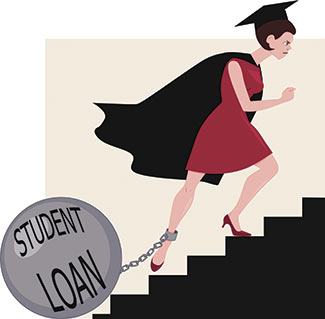Law grads find paying off debt not as easy as they had hoped
By: JESSICA STEPHEN//October 1, 2015//
 When Karen Bauer was in law school, she gave a presentation called “Don’t Freak Out About Your Law School Loans.”
When Karen Bauer was in law school, she gave a presentation called “Don’t Freak Out About Your Law School Loans.”
Judging by what she’s hearing from her fellow graduates – and the nearly 10 percent unemployment rate reported by the American Bar Association for the Class of 2014, a figure down only a fraction from 2013 – she might want to dust it off.
“Overwhelmingly, the people I talk to are anxious and depressed about the amount of student-loan debt they have. Many of them are so fearful of when they’ll ever repay it that they’ve refused to deal with it and let them go into default,” said Bauer, an attorney at the Legal Aid Society of Milwaukee.
Since her graduation from the University of Wisconsin Law School in 2009, Bauer has developed an unexpected specialty in law-school debt and the repayment of student loans.
It’s a familiar story at the State Bar of Wisconsin’s Lawyer Assistance Program, which saw a four percent jump in calls about financial troubles over the last fiscal year. The increase was sharp from previous years, when few calls, if any, were about money troubles.
“They’re struggling with finding a job. They’re struggling with high student-loan payments relative to their income; they’re not making enough,” said Linda Albert, program manager.
“They’re feeling disillusioned. They are anxious. They are depressed. It’s feeling, ‘Will I ever get a job? Did I waste my time going to law school?’ They’re really trying to figure it out. Some people are close to defaulting on their student loans.
And that’s where we see the anxiety and depression set in.
“They thought they would get a job that would support themselves and their families. They get out thinking they’re going to make $70,000, and they make $50,000 and they have $150,000 in student debt. And that doesn’t include their undergraduate debt.
“So, they call our program. And what we’re seeing is young lawyers are putting off things that, typically, they would be engaging in, like marriage and having children and buying homes. It’s changing those decisions, and that is, in some ways, stressful because it’s not what they expected to be doing with a law degree.”
“I felt that pressure, and I still feel it,” said Kate Harrell, who spent six months living at home after graduating from Marquette University Law School with $100,000 in debt.
“I’ve definitely postponed all sorts of things. My car was on its last leg forever; the last thing I could really afford was a car payment. Eventually, I had to do it, but things like that, I feel at this point in my life, shouldn’t be such difficult decisions. Things like vacation – last year was the first time I could afford to take a vacation,” said Harrell, who has been an attorney since 2006.
“You realize you’re not going to get paid what you think you’re going to get paid. Unless you’re with a bigger firm, you’re not going to be making six figures, and that’s a shocking reality when you start.”
With sacrifice, Harrell said, she has paid off half of her law school debt – an accomplishment that, this past year, helped dropped her loan payments from $850 a month to $350.
“That has been a huge relief,” said Harrell, an attorney at Boardman Clark in Madison. “Not having to pay that every month, I don’t worry as much about the debt. But it’s still such a high figure. You make your monthly payment, but it feels like it won’t get paid off until I retire.”
“It is, unfortunately, a little like a life sentence,” conceded Bauer, who walked away with about $130,000 in debt when she graduated in 2009 from the University of Wisconsin Law School.
Like Harrell, Bauer also moved home for a while, living in her sister’s basement for five months while she looked for work and tweeted about student loans.
Nearly six years later, she’s working to retire that debt while paying $1,000 a month for daycare. That latter expense became unavoidable when her husband took a job as an art teacher at a public school.
With so much money walking out the door every month, Bauer’s one saving grace – the great light at the end of a seemingly endless tunnel – has been the hope that her loans will be forgiven.
Under the College Cost Reduction and Access Act, which went into effect in October 2007, student loans can be cancelled if the borrower has made at least 120 payments and has worked at least 10 years in public service.
According to those requirements, Bauer has just four years before her loans can be forgiven.
Yet there are still reasons for anxiety. Bauer’s job, for one, is supported by grants that last only a year. Then there are proposals to curtail, if not eliminate, loan forgiveness – although the Department of Education has suggested grandfathering in certain students who are on a repayment schedule that has been adjusted to take into account their incomes.
Bauer said she knows there are no guarantees.
“It’s terrifying for me to think about losing my job and having to pursue a job to repay loans,” Bauer said.
Universities themselves can help meet some of the needs.
At Marquette, for instance, about 60 graduates in public-sector jobs have received loan assistance – getting about $1,800 each on average – since the program began in 2001, according to the school. To qualify, attorneys must be working as public defenders or prosecutors, for non-profits, for the military or, in general, “on behalf of those with barriers to legal representation.” They also must earn less than the median starting salary made by members of the previous graduating class.
Meeting those requirements may not be hard for notoriously low-paid public servants. But then there are lawyers in private practice.
Those who graduated from Wisconsin’s two law schools, Bauer said, still make about $70,000 a year on average and are often required to meet stricter forgiveness standards than their counterparts in the public sector.
For those reasons, many could be looking at 20 to 25 years before they see any debt relief.
“If you think about what that amount of debt does to a family’s finances or just the ability to have freedom in their careers, it informs why people are so depressed,” Bauer said.
That’s why Paul Katzman tries to help students, before they enter the job market to weigh, their career prospects and likely future income against their debt load.
“At some point, it is time to pay the piper,” said Katzman, assistant dean for career planning at Marquette law school, where 15 to 20 percent of the graduates have gone into public-sector work since 2010.
“What debt does is it’s a fly in the ointment. It’s a wrench thrown in there that has to be accounted for, because that dream job, assuming they’re otherwise qualified, because of that debt or the compensation structure of that field, can become less viable for them.
“Whether it’s enough to steer them away from that, that depends. But it creates a sense of urgency. And we’ll see graduates pursue positions they normally wouldn’t – and you can see it coming, that there will be less satisfaction in that job – but they take that job to begin paying that debt.”
So, what can the legal profession do?
Well, law schools could certainly freeze tuition.
“What a lot of older lawyers don’t understand is why we have this much debt,” Bauer said. “But we have this much debt because, relative to the minimum wage or starting salaries for attorneys, the cost of legal education has gone up exponentially.”
According to the American Bar Association, in-state or resident tuition for public law schools was $2,006 in 1985. In 2012, it was $23,000.
“In 1985, you could easily work 10 hours a week during law school and earn $2,006,” Bauer said.
Today, many law schools discourage students from working, at least in their first year. And, for students like Bauer, who juggled one or two jobs during law school, the income hardly seemed worth the effort.
“The amount of money I made barely made a dent. It cut about $10,000 off my debt; it would have covered my law school education in 1985.”
Harrell believes that lawyers who have been around longer sometimes fail to appreciate their younger colleagues’ struggles.
Harrell said she has discovered that associates might only make a few thousand dollars a year more than senior legal secretaries. In fact, Harrell said that she made about the same as a new associate when she was working, in Denver, as a legal secretary “with virtually no experience.”
“I try not to let it get me down. It’s just a reality in life, but there are times when I think, ‘I just should have gone to work at Epic,’ or you see what senior paralegals are making without incurring that debt. It can be shocking,” Harrell said.
“They lowball it because they can. I think there’s this idea that they can get away with it because people are still desperate for jobs and, maybe, they can get away with it. But it doesn’t do anyone any good. They might get the associate to bite at the offer, but I think you’re setting yourself up for that associate leaving. They’re absolutely going to leave because they have to with the debt.”
Albert agreed.
Things don’t necessarily have to be this way, she said.
In August, her team of volunteers met to talk about ways to reduce the effects of law-school debt on young attorneys.
“We are taking it on as a big piece of our program,” Albert said. “We’re looking at the importance of mentoring programs which get people lined up with another attorney who is working and has made it through.”
Bauer hopes it’s enough.
“It shouldn’t be the case that so many of our lives and futures are so negatively affected by our debt,” she said.
Legal News
- FBI launches criminal investigation into Key Bridge collapse
- Man charged in slaying after woman’s leg found at Milwaukee-area park
- Minnesota man guilty in fatal stabbing of teen on Wisconsin river, jury finds
- Wisconsin teen sentenced in bonfire explosion that burned at least 17
- Wisconsin man who broke into home, ate victim’s chicken, slept in victim’s bed, receives prison and jail sentences
- Judge refuses to dismiss Hunter Biden’s gun case
- House passes reauthorization of key US surveillance program after days of upheaval over changes
- Milwaukee Police officer traveling to Georgia training retires before facing discipline
- Evers to ask legislature to approve largest increase in state support for UW System in two decades
- 7th Circuit Court of Appeals proposes new rules
- Federal agencies allege toxic work environment for women in new report
- Wisconsin man sentenced for sex trafficking a woman and a minor online
WLJ People
- Power 30 Personal Injury Attorneys – Russell Nicolet
- Power 30 Personal Injury Attorneys – Benjamin Nicolet
- Power 30 Personal Injury Attorneys – Dustin T. Woehl
- Power 30 Personal Injury Attorneys – Katherine Metzger
- Power 30 Personal Injury Attorneys – Joseph Ryan
- Power 30 Personal Injury Attorneys – James M. Ryan
- Power 30 Personal Injury Attorneys – Dana Wachs
- Power 30 Personal Injury Attorneys – Mark L. Thomsen
- Power 30 Personal Injury Attorneys – Matthew Lein
- Power 30 Personal Injury Attorneys – Jeffrey A. Pitman
- Power 30 Personal Injury Attorneys – William Pemberton
- Power 30 Personal Injury Attorneys – Howard S. Sicula











